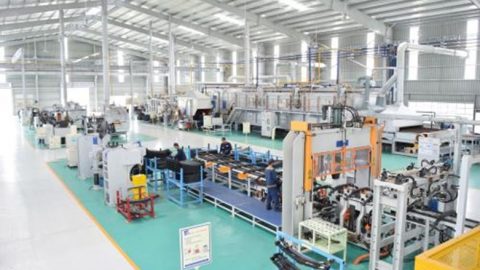
The production line at THACO's Nhip factory
Truong Hai Auto Company (THACO) was established on April 29, 1997 at IIA Building, 10 Mai Chi Thea Street, Thu Thiem Ward, District 2 with a total current staff of about 20,000.
With 3 core investment cycles, THACO is currently the leading enterprise in the automotive and supporting industries, the product has a full range of types: trucks, buses, passenger cars, specialized vehicles and Full range from mid-end to high-end with sales and market share always leading the Vietnam market for many years. THACO identified automation and management in the direction of digitization as one of the current top priorities for improving product quality and competitiveness, mastering the production process to actively integrate and implement. The goal is to participate in the global value chain.
Nhip factory has invested in an automated production line system in the stages of feeding, changing molds, adjusting, recording data, etc monitoring product quality with the application of digitization and automation with it, MES systems to synthesize, analyze and issue warnings to promptly detect defective products and optimize production processes, thereby improving the production capacity of the factory from 6,000 tons/year to 10,000 tons/year and 5% reduction in annual product prices, creating a competitive advantage to expand export markets.
At the Mold factory, THACO has implemented the solution of automatic ingot feeding on CNC lathes and digitizing data at the CNC turning line, applying automatic technology on CNC machines in the manufacturing process. Automatic CNC technology allows flexibility in operation, helps reduce errors and save time, reduce labor.
The enterprise has also invested in modern automatic equipment originating from the Americas and Europe, such as testing and testing machines water-jet cutting robots, etc, using the self-propelled vehicle (AGV) system in operation transfer components, supplies, reduce labor, and improve safety in production. Currently, the automation rate at THACO supporting industrial plants is nearly 60%.
A worker standing in front of the automation system control panel said: “Every day, nearly 200 vehicles are shipped but the whole factory has only about 100 officers, engineers and workers. Most of the stages are done by robots. Humans mainly undertake the operation of the robot system and perform some assembly and connection of accessories. In order to stand and operate modern lines like this, engineers and workers have been carefully selected by the company and sent to Japan to train with a special regime etc.”
Productivity and Quality Office